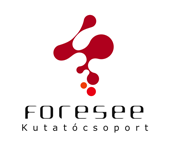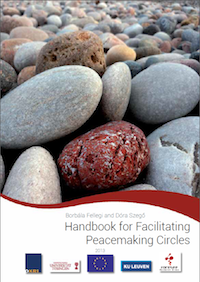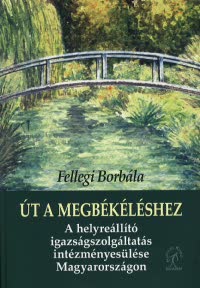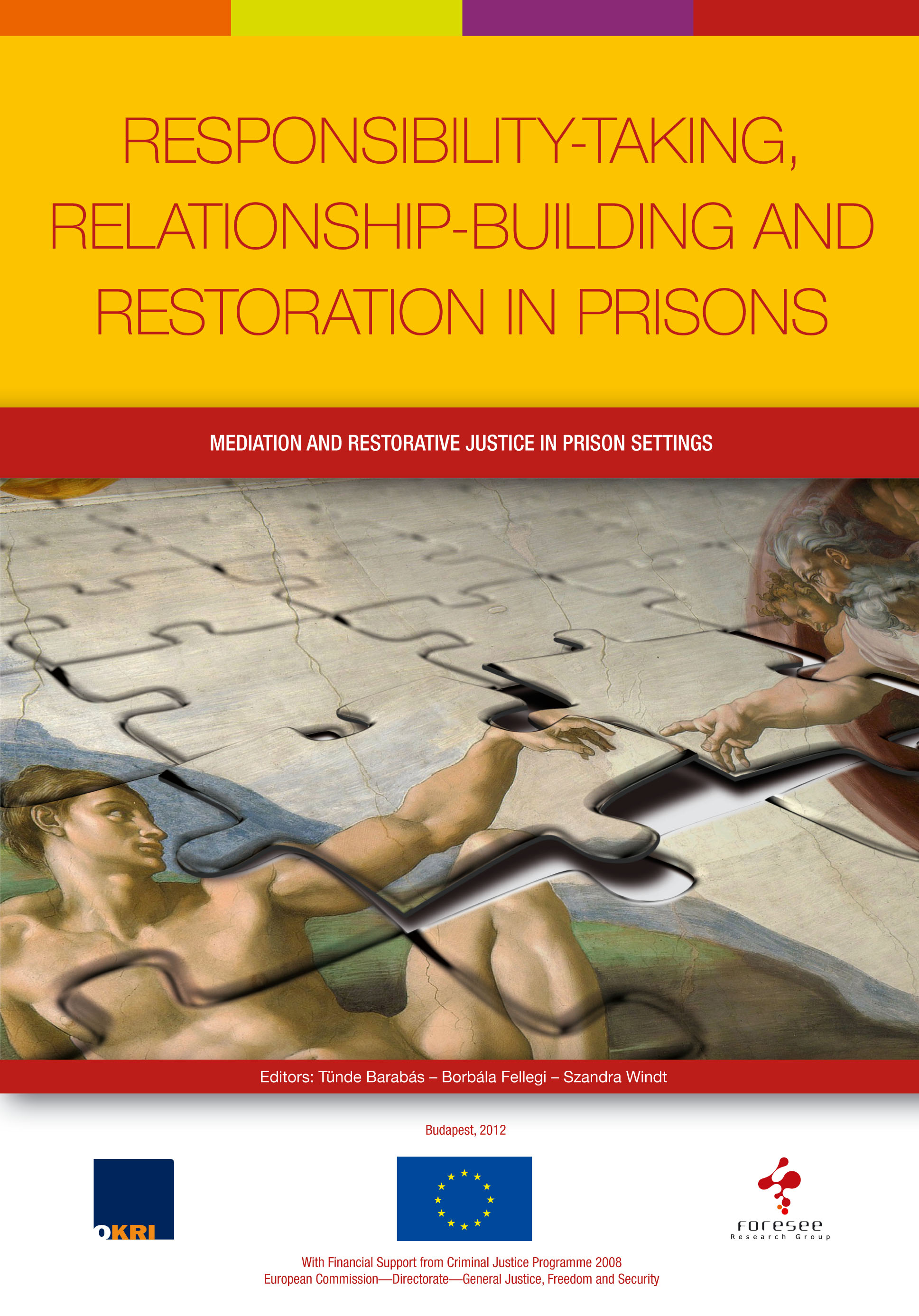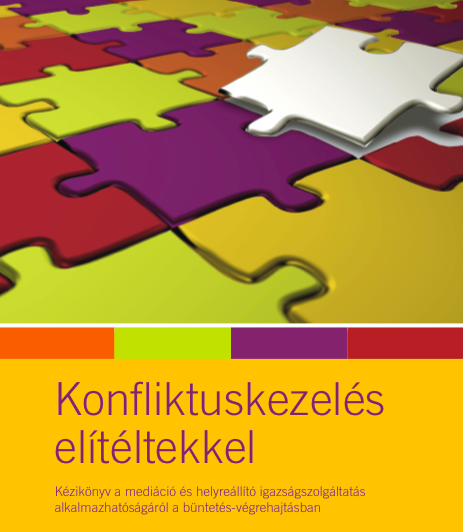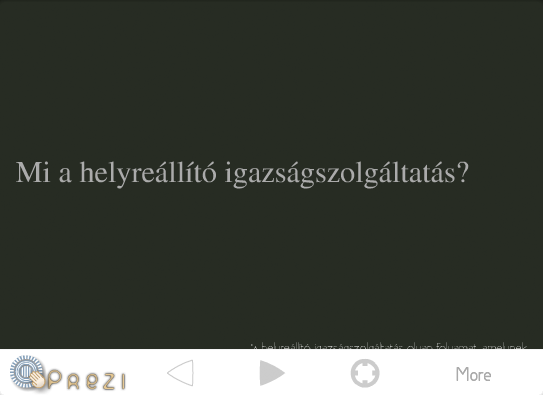
foresee.hu
2023. 11. 18
|
Ez a 100 perces videó vágatlanul mutatja be Fellegi Borbála és Winkler-Virág András Zoom felületen végigvitt komediációs folyamatát, amellyel egy munkahelyi konfliktust kezeltek. A szituáció alapja valós, azonban - az anonimitás megőrzése érdekében - az érintetteket nem a tényleges felek, hanem... |
2023. 11. 18
|
A Podcast innen elérhető: |
2023. 04. 10
|
A Foresee Kutatócsoport partnerként vesz részt a 2022. október 1-től 2025. szeptember 30-ig tartó IMPROVE projektben. Az IMPRODOVA folytatásának is tekinthető program célja, hogy a kapcsolati erőszakot észlelő és arra reagáló hatósági és civil szereplők szolgáltatásait hatékonyabbá tegye, így közvetve támogatást adjon az áldozatoknak is. Az IMPROVE projekt közvetlen céljai: - egy többnyelvű, mesterséges intelligencia alapú chatbot kifejlesztése, ami... |
2023. 03. 23
|
"Egy PhD disszertáció esetében mindenképpen a munka hasznosságát, időszerűségét mutatja, ha a dolgozatot nemcsak az értékelők csapata, hanem a szakmai, illetve a témával foglalkozó, de nem ezen a területen dolgozó olvasóközönség is érdeklődéssel forgathatja. Fellegi Borbála könyve ezek közé a munkák közé tartozik, s az - egyébként maximális pontszámmal megvédett, és csekély átdolgozással közreadott - egykori dolgozat önálló szakkönyvként is kiválóan megállja a helyét." (Bányai Emőke, In: Esély, 2009/4) -Hogyan használhatjuk konfliktusainkat közösségi kötelékeink erősítésére? |
2023. 02. 17
|
Dr. Magyar Erika, a Foresee Kutatócsoport korábbi munkatársa tollából megjelent "A közvetítői eljárás mint a helyreállító (resztoratív) igazságszolgáltatás eszköze" című cikk az Ügyvédek Lapjának 2023/1-es számában. A közvetítői eljárás a bűncselekmények, illetve szabálysértések érintettjei számára ad lehetőséget az ügy gyors, megegyezésen alapuló lezárására, elkerülve ezzel a hosszan tartó bírósági procedúrát, pereskedést. Az eljárással kapcsolatban kiemelt fogalom a felelősségvállalás mellett a jóvátétel... |
2022. 06. 30
|
Konfliktusokkal, „horzsolásokkal”, begyógyult és nem begyógyult sebekkel naponta találkozunk mind személyközi viszonyainkban, mind a minket körülvevő közösségekben és a társadalmi szintű folyamatokban. Jelen tanulmány azt járja körül, hogy egy-egy konfliktust, traumát követően mi minden történik akkor, amikor a szereplők a fájó eseményt követően tovább távolodnak egymástól. Mi történik akkor, amikor azt látjuk, hogy egy konfliktus „betokosodik”, a felek között egyre... |
2022. 06. 30
|
Konfliktusokkal, „horzsolásokkal”, begyógyult és nem begyógyult sebekkel naponta találkozunk mind személyközi viszonyainkban, mind a minket körülvevő közösségekben és a társadalmi szintű folyamatokban. Jelen tanulmány azt járja körül, hogy egy-egy konfliktust, traumát követően mi minden történik akkor, amikor a szereplők a fájó eseményt követően tovább távolodnak egymástól. Mi történik akkor, amikor azt látjuk, hogy egy konfliktus „betokosodik”, a felek között egyre... |
2020. 06. 10
|
Article by Dóra Szegő, Researcher of the Foresee Research Group According to the statistics, in Hungary on an average three women are killed by their partners in a month. Since the IMPRODOVA research has started (May 2018), several fatal domestic violence (DV) incidents have been reported by the media, which shed light to the dysfunctional institutional answers... |
2020. 05. 18
|
Mint arra az elmúlt hónapokban néhány szélsőséges bűncselekmény is rávilágított, sok problémával küzd a kapcsolati erőszak kezelésekor az igazságügy, a szociális szektor és az egészségügyi ellátórendszer. Az erőszakra sok esetben csak akkor derül fény, amikor már helyrehozhatatlan a veszteség. Ennek a helyzetnek ráadásul most új kontextust teremt a koronavírus. A Foresee Kutatócsoport az IMPRODOVA kutatási program keretében a rendőrség, a szociális és egészségügyi szektor munkatársait kereste fel. Az összesen nyolc Európai Uniós országban zajló vizsgálat... |
2020. 02. 05
|
Örömmel tesszük közzé a Peacemaking Circles in Europe projektünk keretén belül, Szegő Dórával elkészített kézikönyvünk magyar változatát. Ennek a kiadványnak főként azon gyakorló szakemberek képezik a célcsoportját, akik már tapasztaltak a mediációban és/vagy az egyéb resztoratív gyakorlatokban, és nyitottak arra, hogy facilitátorokként kísérletezzenek a békítőkörökkel a praxisukon belül. |
2018. 07. 10
|
A Budapest Központ örömmel jelenti be, hogy a Foresee Kutatócsoport együttműködésével megvasuló „A radikalizáció megelőzése a büntetés-végrehajtási intézményekben” (BBA-5.1.6-16-2016-00001) című, az Európai Unió Belső Biztonsági Alapjának társfinanszírozásával támogatott projektjének Dr. Héra Gábor Foresee kutató által készített zárótanulmánya elérhető. A magyar nyelvű összefoglaló tanulmány |
2018. 07. 09
|
The Budapest Centre is pleased to announce the release of the Summary Study of its year-long project in which Foresee Research Group was also a partnering organisation: “Prevention of radicalization in the prison-system” (BBA-5.1.6-16-2016-00001) co-financed by the Internal Security Fund of the European Union. The strengthening of radicalization and extremism is a new international trend. Its prevention, the development and harmonization of relevant capabilities is in the interest of international and national communities. The so called „vulnerable” groups of societies, in particular persons with... |
2018. 07. 02
|
A Foresee Kutatócsoportnak ítélte meg nemzetközi díját az Európai Fórum a Helyreállító Igazságszolgáltatásért (European Forum for Restorative Justice - EFRJ), melyet eddig kizárólag magánszemélyek kaphattak meg. Ennek a rangos díjnak a célja olyan, többnyire kutató vagy aktivista személyek és szervezetek munkájának értékelése es elismerése, akik vagy amelyek hozzájárultak a helyreállító igazságszolgáltatás... |
2018. 07. 02
|
A frissen elnyert „Helyreállító Igazságszolgáltatásért”-díj apropóján dr. Fellegi Borbálával, a Foresee Kutatócsoport alapító-ügyvezetőjével beszélgettünk a vitarendezés alternatív módszereiről, a resztoratív szemléletről, mediációról vállalati és egyéb közegekben, és arról, hogy általában véve és konkrét esetekben hogyan lehetséges és hogyan érdemes a konfliktusokat kezelni. Forrás: hrpwr.hu „Ja, te nem is velem akartál kiszúrni!” − Így zajlik a mediáció A frissen elnyert „Helyreállító Igazságszolgáltatásért”-díj apropóján dr. Fellegi Borbálával, a... |
2018. 05. 31
|
Az 5 éves kutatás fókuszában a gyûlölet-bûncselekmények tanulmányozása áll Magyarországon és az EU egyéb tagállamaiban. A Foresee Kutatócsoport számára nagy lehetõség és megtiszteltetés, hogy kutatóink részt vehetnek Dr. Bárd Petra frissen alakuló kutatócsoportjában. Ez a kutatás a |
